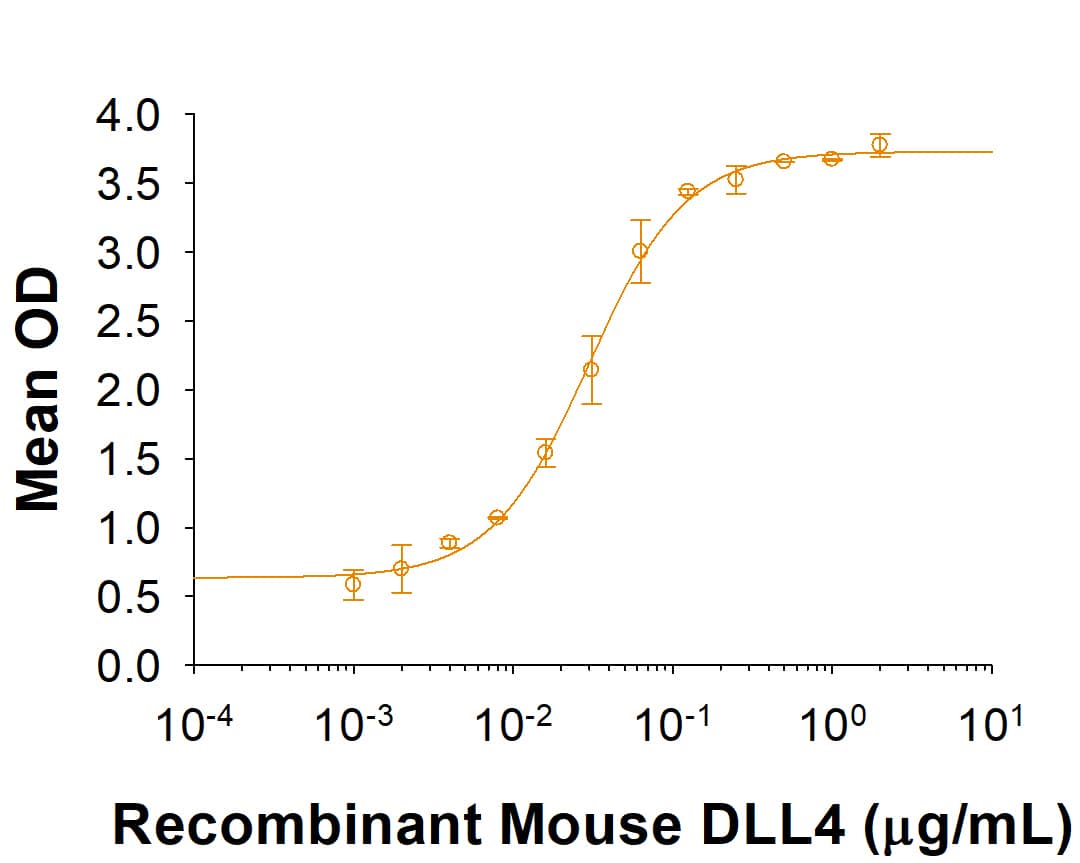Recombinant Human L-Selectin/CD62L Protein, CF Summary
Product Specifications
Trp39-Asn332
Customers also Viewed
Product Datasheets
Carrier Free
CF stands for Carrier Free (CF). We typically add Bovine Serum Albumin (BSA) as a carrier protein to our recombinant proteins. Adding a carrier protein enhances protein stability, increases shelf-life, and allows the recombinant protein to be stored at a more dilute concentration. The carrier free version does not contain BSA.
In general, we advise purchasing the recombinant protein with BSA for use in cell or tissue culture, or as an ELISA standard. In contrast, the carrier free protein is recommended for applications, in which the presence of BSA could interfere.
ADP2
| Formulation | Lyophilized from a 0.2 μm filtered solution in PBS containing Calcium and Magnesium with Sorbitol. |
| Reconstitution | Reconstitute at 0.2 mg/mL in sterile PBS. |
| Shipping | The product is shipped at ambient temperature. Upon receipt, store it immediately at the temperature recommended below. |
| Stability & Storage: | Use a manual defrost freezer and avoid repeated freeze-thaw cycles.
|
Background: L-Selectin/CD62L
Human L-Selectin (Leukocyte Selectin, LAM-1, LECAM-1, LECCAM-1, TQ1, Leu-8, MEL-14 antigen, DREG, lymph node homing receptor, CD62L), a member of the Selectin family, is a cell surface glycoprotein expressed constitutively on a wide variety of leukocytes. Two forms of L-Selectin have been reported, apparently arising as a result of post-translational modifications. The lymphocyte form shows an apparent molecular weight of 74 kDa, while the neutrophil form is 90-100 kDa. L‑Selectin plays a role in the migration of lymphocytes into peripheral lymph nodes and sites of chronic inflammation, and of neutrophils into acute inflammatory sites. Acting in cooperation with P-Selectin and E-Selectin, L-Selectin mediates the initial interaction of circulating leukocytes with endothelial cells that produces a characteristic ‘rolling' of the leukocytes on the endothelium. This initial interaction is followed by a stronger interaction involving ICAM-1 and VCAM-1, that leads eventually to extravasation of the white blood cell through the blood vessel wall into the extracellular matrix tissue. ELISA techniques have shown that detectable levels of soluble L-Selectin are present in the biological fluids of apparently normal individuals. Furthermore, a number of studies have reported that levels of L-Selectin may be elevated or lowered in subjects with a variety of pathological conditions.
Citations for Recombinant Human L-Selectin/CD62L Protein, CF
R&D Systems personnel manually curate a database that contains references using R&D Systems products. The data collected includes not only links to publications in PubMed, but also provides information about sample types, species, and experimental conditions.
3
Citations: Showing 1 - 3
Filter your results:
Filter by:
-
Saikosaponin D isolated from Bupleurum falcatum inhibits selectin-mediated cell adhesion.
Authors: Jang M, Kim Y, Bae E, Oh T, Choi H, Lee J, Oh H, Lee S
Molecules, 2014-12-04;19(12):20340-9.
Species: Human
Sample Types: Whole Cells
Applications: Bioassay -
Regulation of leukocyte recruitment by the long pentraxin PTX3.
Authors: Deban L, Russo RC, Sironi M, Moalli F, Scanziani M, Zambelli V, Cuccovillo I, Bastone A, Gobbi M, Valentino S, Doni A, Garlanda C, Danese S, Salvatori G, Sassano M, Evangelista V, Rossi B, Zenaro E, Constantin G, Laudanna C, Bottazzi B, Mantovani A
Nat. Immunol., 2010-03-07;11(4):328-34.
Species: Human
Sample Types: Recombinant Protein
Applications: Binding Assay -
Synthetic glycoprotein mimics inhibit L-selectin-mediated rolling and promote L-selectin shedding.
Authors: Mowery P, Yang ZQ, Gordon EJ, Dwir O, Spencer AG, Alon R, Kiessling LL
Chem. Biol., 2004-05-01;11(5):725-32.
Applications: Western Blot
FAQs
No product specific FAQs exist for this product, however you may
View all Proteins and Enzyme FAQsReviews for Recombinant Human L-Selectin/CD62L Protein, CF
There are currently no reviews for this product. Be the first to review Recombinant Human L-Selectin/CD62L Protein, CF and earn rewards!
Have you used Recombinant Human L-Selectin/CD62L Protein, CF?
Submit a review and receive an Amazon gift card.
$25/€18/£15/$25CAN/¥75 Yuan/¥2500 Yen for a review with an image
$10/€7/£6/$10 CAD/¥70 Yuan/¥1110 Yen for a review without an image










